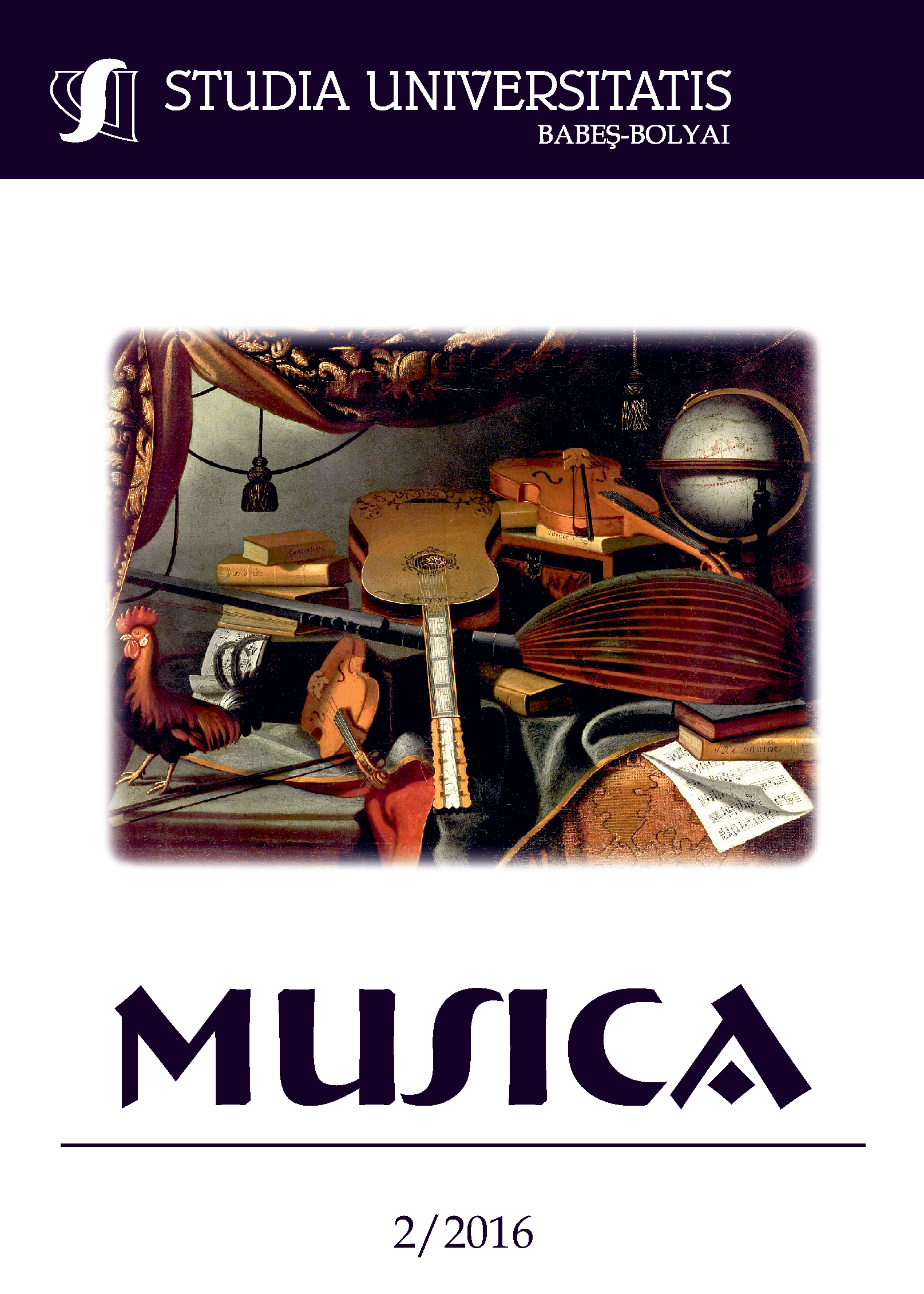CREATING THE ROMANIAN NATIONAL MUSICAL STYLE – A PROBLEM OF MUSICAL OR NATIONAL IDENTITY?
Keywords:
ideology, nationalism, identity, musical style, Romanian composersAbstract
My communication analyses the relationship of interdependency between ideology and music in Romania. My intention is to discover this relationship in the discourses of the composers’ and music critics through what they understood by national style. We will see how this discourse has been influenced by the political context and modified in relationship with the shifts of the political regimes. Therefore, I will emphasize the discursive forms of the national specificity in music shaped by the apparently contradictory political ideologies. These range from the nationalist ideology that reached its peak in the interwar period to the communist ideology with its specific forms of nationalism. The temporal setting covers a period of almost one century which will allow us to observe the apparition, development and intersection of political ideologies, especially of the nationalism, and their reflection in understating the national style. The national specific discourse is, after all, one of identity perceived in relation to the otherness. The identity discourse fits into the process of the construction of the national identity, which assumes a definition and delimitation from the otherness. Therefore, we will have the national – universal dichotomy, based on the East-West or the Centrum-Periphery relation, and its metamorphoses. Thus, in the pre and the interwar period the emphasis is put on the ethnical element; in the communist period, with the first internationalist phase, the class solidarity replaced the ethnical one and, finally, in the nationalist phase the political strategies appealed to older sensibilities of the autochthonous collective imaginary.References
***, Muzica românească (The Romanian music), in: Muzica, an II, nr. 3, ianuarie 1920, pp. 97-118.
Borgovan, Ion, La Gheorghe Enescu (At Gheorghe Enescu), in: Luceafărul, Sibiu, 16 mai 1912, p. 287.
Breazul, George, Concepţiile dominante în muzică (The dominant conceptions in music) in: Gândirea, nr. 1, 1931.
Brediceanu, Tiberiu, Concertul «Carmen» la Sibiu (The «Carmen» concert at Sibiu) in: Luceafărul, Budapesta, an IV, nr, 19, 1 octombrie 1905, p. 372.
Brediceanu, Tiberiu, În chestiunea «Şezătoarei» (About the «Şezătoarea» issue), in: Românul, an IV, Arad, nr. 25, sâmbătă 1/14 februarie 1914, p. 8.
Codru T., (Octavian Tăslăuanu), Muzica românească. De vorba cu d-l Gh. Dima (The Romanian music. Speaking with Mr. Gh. Dima) in: Luceafărul, nr. 6, 1913, p. 203.
Crotty, Joel, A Preliminary Investigation of Music, Socialist Realism, and the Romanian Experience, 1948–1959: (Re)reading, (Re)listening, and (Re)writing Music History for a Different Audience, in: Journal of Musicological Research, Routledge, 2007, 26:2-3, 151-176.
Dahlhaus, Carl, Nineteenth Century Music, trans. J. Bradford Robinson, Univ. of California Press, 1989, p. 40.
Firca, Clemansa Liliana, Modernitate şi avangardă în muzica ante- şi interbelică a secolelor XX. 1900-1940 (Modernity and avangarde in pre and interwar music of the 20th century), phd thesis, Cluj-Napoca, 1998, p. 164.
Francfort, Didier, Le chant des Nations. Musiques et Cultures en Europe, 1870-1914 (The song of the nations. Music and culture in Europe, 1870-1914), Hachette Littératures, 2004, p. 11.
Glodeanu, Liviu, Apartenenţa compozitorului la cultura naţională (The apartenence of composer to a national culture), in: Muzica, nr. 3, 1966, pp. 8-9.
Hutchinson, John, Cultural Nationalism and Moral Regeneration, in: Nationalism, ed. John Hutchinson, Antony D. Smith, Oxford University Press, 1994, p. 123.
Popovici, Timotei, Principiul naţional în muzică (The national principle in music), in: Anuarul Institutului Teologic, Sibiu, Anul XXIII, 1907, pp. 2-16.
Sandu-Dediu, Valentina, Muzica românească între 1944-2000 (The Romanian music between 1944-2000), Ed. Muzicală, Bucureşti, 2002.
Şorban, Guilelm, În jurul “Şezătoarei” (Around «Şezătoarea») in: Românul, Arad, an. IV, nr. 30, vineri 7/20 februarie 1914, pp. 5-6.
Vancea, Zeno, Legătura dintre tradiţie şi inovaţie văzută în lumina dezvoltării creaţiei muzicale româneşti (The relation between tradition and invovation seen in the light of the Romanian music’s development), in: Naţional şi universal în muzică. (National and universal in music), 10-12 mai 1967, Conservatorul de muzică „Ciprian Porumbescu”, Bucureşti, p. 25.
Vancea, Zeno and Ştefan Niculescu, Raportul între naţional şi universal în lumina dezvoltării istorice a muzicii (The connection between national and universal in the light of the music’s historical development), in: Muzica, nr. 3, 1966, p. 2.
Verdery, Katherine, Compromis şi rezistenţă. Cultura română sub Ceauşescu (Compromise and resistance. The Romanian culture under Ceauşescu), Humanitas, Bucureşti, 1994, p. 64.
Vidu, Ion, Literatură şi artă naţională. Reflecţiuni abstracte de interes actual (National literature and art. Abstract reflections for the actual interest), in: Drapelul, Lugoj, 31 ian/1902, p. 3.
Downloads
Published
How to Cite
Issue
Section
License
Copyright (c) 2016 Studia Universitatis Babeș-Bolyai Musica

This work is licensed under a Creative Commons Attribution-NonCommercial-NoDerivatives 4.0 International License.



